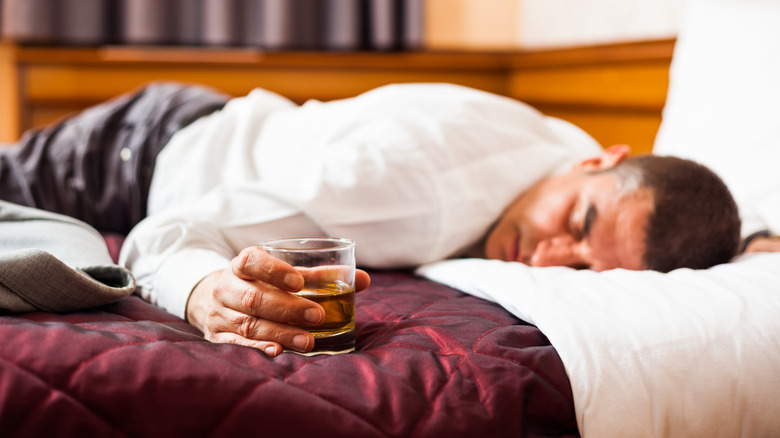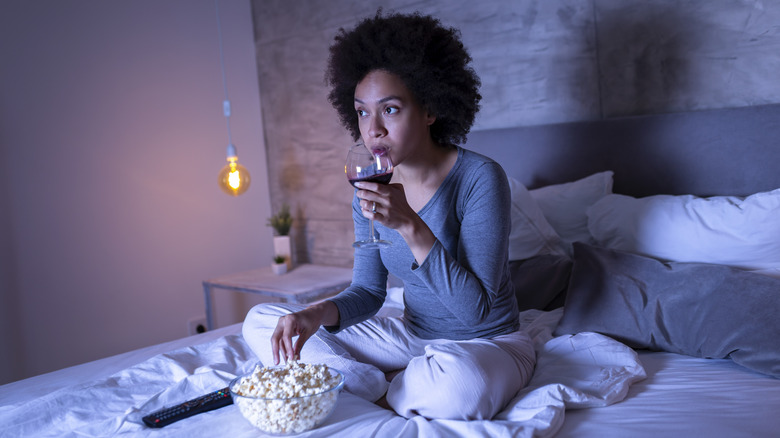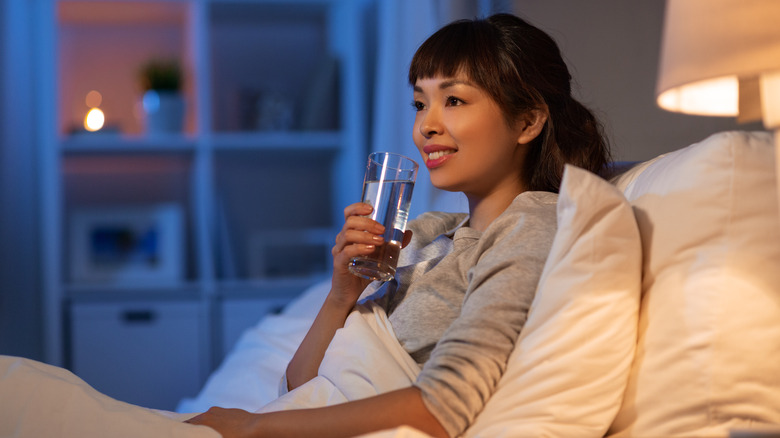Is It Dangerous To Fall Asleep When You're Drunk? What You Should Know
Whether it's a wedding, graduation, or holiday celebration, you might occasionally find yourself imbibing a few more drinks than usual. You might notice slurred speech, mood swings, problems concentrating, and, worst of all, the inability to make wise decisions. Rather than continue your wild evening, you decide to go home and sleep it off before you get into more trouble.
Although coming home to a safe place is probably a wise choice, going to sleep right away might not be. Too little time between your last drink and when your head hits the pillow could pose some risks to your health. That's because your blood alcohol concentration (BAC) can continue to rise if you fall asleep too quickly after your last drink. Drinking too much just before bedtime can put you at risk for alcohol poisoning and may even lead to brain damage. Alcohol suppresses your gag reflex — so if you're passed out and need to vomit, you could choke.
Falling asleep even after a few drinks can also disrupt your sleep, which can be dangerous over time. Long-term sleep deprivation can lead to mental health issues, a weakened immune system, weight gain, and cardiovascular problems, according to Sleep Health Solutions.
How alcohol affects your sleep
Ever feel night sweats or a rapid heart rate after falling asleep drunk? That's because alcohol opens up your blood vessels, causing that racing heartbeat and sweating. Alcohol might help you fall asleep quickly at first — but once it wears off, you might find yourself wide awake. You're also more likely going to head to the bathroom when that happens because alcohol's diuretic effect will have you shedding more water.
How much you drink before bedtime can significantly affect your sleep quality, according to the Sleep Foundation. Sleep quality is a combination of how quickly you fall asleep, how often you get up during the night, how much sleep you get altogether, and how much time in bed you're actually sleeping. Moderate drinking (which is one drink for women and two for men), can decrease your sleep quality by 25%. Drinking more than that can disrupt your sleep quality by 40%.
The Sleep Foundation also says that alcohol disrupts your sleep cycle. Without alcohol, your sleep will typically cycle six times through deep sleep, light sleep, and REM (rapid-eye movement) sleep. Alcohol will suppress REM sleep in the first two cycles of your sleep, and this causes an imbalance in your overall sleep cycle. Remember that REM sleep is important in consolidating your memory.
Aim for zero alcohol before bedtime
Even if you can't avoid indulging every once in a while during celebrations with family and friends, it's best to keep an eye on the clock and stop drinking a few hours before bedtime. Rather than choose that double IPA with a higher amount of alcohol, choose drinks with a fixed, lower amount of alcohol. In other words, you might not know how many shots might be in that grapefruit crush, but you'll know how much is in a glass of red wine. However, you'll need to keep an eye on your pours. It's easy to get two servings of red wine in a single glass. Find a way to track how many drinks you have in an evening through a tally app. You can also try placing a bottle cap or straw into your pocket for each drink you consume.
Even if you know you overindulged in drinking that evening, drink a tall glass of water before bed and keep one on your nightstand for the next morning. Avoid taking certain over-the-counter (OTC) pain relievers the night before, especially while alcohol is still in your system. Ibuprofen mixed with alcohol can cause significant irritation to your digestive tract. You risk liver damage if you mix alcohol with acetaminophen. Although it might sound obvious, you should definitely avoid taking a sleep aid before bed if you've been drinking.



